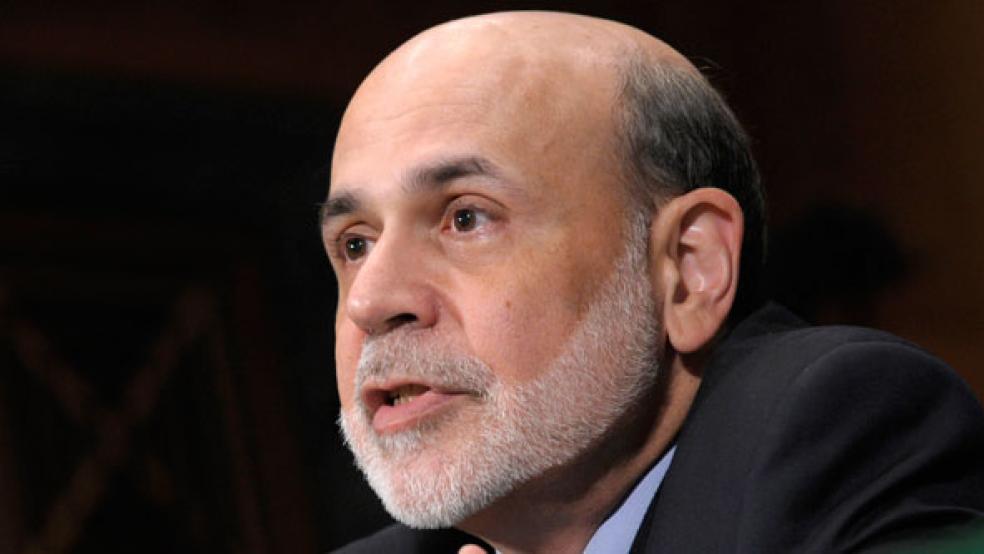Although stocks surged Tuesday amid hopes that Federal Reserve Chairman Ben Bernanke will reveal new measures to stimulate the economy when he speaks at the annual central bank economic conference in Jackson Hole, Wyo.,on Friday, most economists and investment strategists don’t expect a dramatic announcement. After continuing to move up on Wednesday morning, by aftermoon major indexes were up slightly.
Yesterday investors seemed to think that recent economic data give the Fed no choice but to act. The Commerce Department said new-home sales dropped to a five-month low in July, and the rate is less than half what economists consider a healthy market. A survey from the Richmond Federal Reserve bank showed a drop in manufacturing activity. The unemployment rate has hovered around 9 percent for months and in July stood at 9.1 percent. In a statement after the Fed’s policy committee meeting on Aug. 9, Bernanke hinted at the possibility of further measures if the economy continues to stall and said interest rates will remain low for at least two years.
But many economists say the Fed’s options are limited. They expect that, in an effort to soothe the financial markets, Bernanke will sound more reassuring about the economic outlook than in the Aug. 9 statement. He also is expected to run through the Fed's remaining policy options and could give a clearer indication of what might come next.
However, most economists don’t foresee a third round of quantitative easing, or QE3 -- the purchase of Treasury securities to drive up prices and keep interest rates low -- or don’t think it would help.
Axel Merk, founder of Merk Investments and manager of the Merk Hard Currency Fund, says he doesn’t believe QE3 is necessary because the money that the Fed made available through securities purchases is still in the system. “We don’t really need to have an additional round of quantitative easing to get further stimulus,” Merk says. He notes that Bernanke, by committing to keep the key overnight lending rate for banks at or near zero “at least through mid-2013,” was able to move short-term rates low with words rather than actions.
“Bernanke is pretty market-savvy in many ways,” says Michael D. Cohn, president, Global Arena Investment Management. “He understands – and this has been going on for the last 18 months – that the Fed has been doing the heavy lifting in terms of keeping confidence in the economy above water. I think he’s going to be more explicit about what he is going to do in the short term, or the medium term, to try and spur confidence a little bit.”
Citigroup credit strategists wrote last week that “both the political and the economic hurdles to QE3 remain high,” noting that inflation in the U.S. has risen to 3.6 percent year-over-year from 1.2 percent 12 months ago. Bernanke told Congress in July that the Fed is ready to act in the face of new economic weakness, but only if inflation were falling enough to renew worries about deflation.
“QE2 … helped to lift asset prices, temporarily as we’ve seen, but critics knew there was no real-life economic impact, as evidenced by the almost zero growth seen in the first half of 2011,” Peter Boockvar, equity strategist at Miller Tabak wrote in an email to clients. “If QE3 gets the green light, expect again only a cheer from asset markets but a cheer that won’t last very long again because the Fed has well worn out its welcome. That will give no help to actual economic growth.”
Pavlina Tcherneva, economics professor at Franklin and Marshall College, said Bernanke may “try to reassure investors again that the Fed has tools at its disposal to stimulate growth.” But she added that “markets will not be easily persuaded… Markets are realizing that the Fed is not omnipotent after all, and that given its limited effectiveness and no fiscal stimulus on the horizon, the most we can expect is for the economy to muddle through.”
The Fed has already cut its target for the overnight interest rate, traditionally its key tool for influencing the economy, almost to zero. “Given what has happened already, maybe you could squeeze this a little more, but how much are you going to get?” Ray Stone of Stone & McCarthy Research Associates told The Fiscal Times earlier this month. “I don't think you can get much mileage out of this.”
Stakes Are High for Friday
On Friday the Commerce Dept. will also release on Friday a revised estimate of second-quarter GDP. The advance estimate, announced last month, showed the economy has grown only 1.6 percent over the past year. “When growth slows to less than 2 percent on a year-to-year basis, the economy is simply unable to withstand a major shock or policy mistake,” said Wells Fargo economist Mark Vitner.
Economists at Barclays Capital, among others, believe the GDP data and stubbornly high unemployment raise questions about the rate at which the economy is able to grow without generating inflation and whether that growth rate has shifted down in recent years.
Investors may be disappointed if a third round of easing isn’t announced Friday. “If Friday’s message comes out really wishy-washy and says nothing, I think the market will not take that well on Monday and Tuesday,” said Cohn, while adding that he thinks it will then stabilize. “The jury is still out on what the economy is doing right now,” he added, noting the report today that durable goods orders rose in July.
Merk suggests that the market’s volatile swings may continue no matter what Bernanke & Co. say. “The market will always be disappointed about something,” says Merk. “We’ve had dramatic volatility in the markets no matter what. I wouldn’t attribute that so much to substance of what is said as to the environment.”
With reporting by Maureen Mackey and Yuval Rosenberg.




